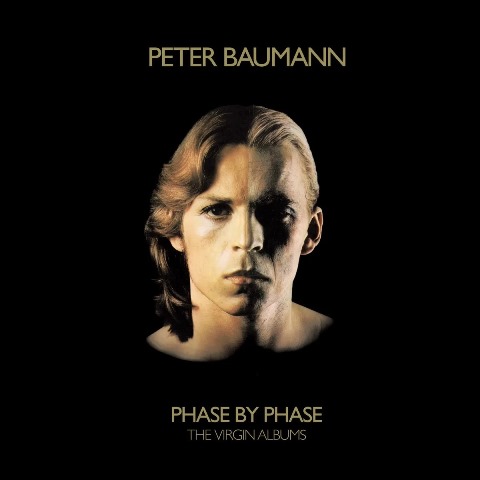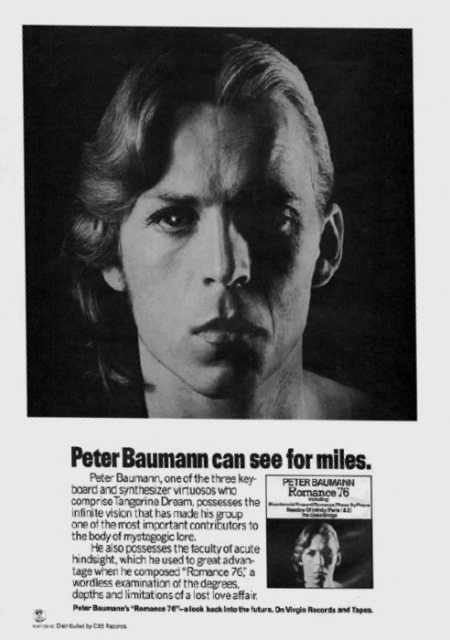Music Reissues Weekly: Peter Baumann - Phase by Phase: The Virgin Albums | reviews, news & interviews
Music Reissues Weekly: Peter Baumann - Phase by Phase: The Virgin Albums
Music Reissues Weekly: Peter Baumann - Phase by Phase: The Virgin Albums
The surprising solo adventures of a core member of Tangerine Dream

When the first solo album by Tangerines Dream’s Peter Baumann was released in the US in 1977, its promotion was striking. Press advertising (pictured below left) said “he possesses the infinite vision that has made his group one of the most important contributors to mystagogic lore.”
Baumann had joined Tangerine Dream — "his group" — in 1971, and left in late 1977. The album in question, Romance ’76, was recorded in Berlin and Munich in July and August 1976 and first issued in the UK by Virgin Records in February 1977.
 Discussing the album with NME’s Miles before its release, there was no mention of “mystagogic lore.” Baumann explained "I always was afraid of doing solo work because I always thought that putting so much energy and so much concentration into it was losing concentration for the group. But this was not the case for this record. I like to call [Romance ’76] an edge point of pop music. I hate the word 'avant-garde' and I don't want to do avant-garde and can't identify with it. I'd like to do some edge points of pop music where people are absolutely enjoying themselves — identifying themselves with it but still it's so attractive that people are actually listening. This is what I'm doing at the moment.”
Discussing the album with NME’s Miles before its release, there was no mention of “mystagogic lore.” Baumann explained "I always was afraid of doing solo work because I always thought that putting so much energy and so much concentration into it was losing concentration for the group. But this was not the case for this record. I like to call [Romance ’76] an edge point of pop music. I hate the word 'avant-garde' and I don't want to do avant-garde and can't identify with it. I'd like to do some edge points of pop music where people are absolutely enjoying themselves — identifying themselves with it but still it's so attractive that people are actually listening. This is what I'm doing at the moment.”
The three tracks on Side One of Romance ’76 were, mostly, in line with Tangerine Dream but the flip was something else. Along with synthesisers and a Mellotron, the album’s second side features strings, a wordless chorale and percussion. There were passing similarities with Carl Orff’s Carmina Burana. Baumann was pushing into new territory. It was, though, a little while before he would get to, as he put it, the “edge points of pop music.”
After Baumann’s departure from Tangerine Dream, Romance ’76 was followed by two further solo albums: Trans Harmonic Nights (issued in 1979) and Repeat Repeat (issued in 1981). These are where he converged with pop music. All three albums are collected in the clamshell box set Phase By Phase: The Virgin Albums. Baumann was busy over 1978 to 1981. As well as completing his second and third solo albums, he also produced Cluster, Hans-Joachim Roedelius and Conrad Schnitzler. When he was recording Romance ’76, Baumann had met and discussed his musical approaches with David Bowie, who was in Berlin recording what would become Low, which was released a month before Romance ’76. Baumann and Bowie’s albums shared a stylistic disparity between what was on Side One and Side Two. Being in Tangerine Dream wasn’t a stricture. There was no typecasting. Indeed, Baumann co-produced Repeat Repeat with Robert Palmer. Despite all this, Trans Harmonic Nights and Repeat Repeat were surprising: surprisingly poppy.
 Repeat Repeat was trailed by the release of its title track as a single. There could now be no doubt that Peter Baumann was not looking back at Tangerine Dream. A slice of bouncy, funk-edged electropop, it even bore a slight Gary Numan flavour. The album’s “Real Times” was the next single. Again, it was absolutely on point for the era’s synth pop. On Side One, “Home Sweet Home” has echoes of Bowie’s “Heroes” and “V-2 Schneider.” Overall, Repeat Repeat positioned Baumann as enormously contemporary,
Repeat Repeat was trailed by the release of its title track as a single. There could now be no doubt that Peter Baumann was not looking back at Tangerine Dream. A slice of bouncy, funk-edged electropop, it even bore a slight Gary Numan flavour. The album’s “Real Times” was the next single. Again, it was absolutely on point for the era’s synth pop. On Side One, “Home Sweet Home” has echoes of Bowie’s “Heroes” and “V-2 Schneider.” Overall, Repeat Repeat positioned Baumann as enormously contemporary,
Tracking back to 1979, the elegant Trans Harmonic Nights – recorded in Berlin between July 1978 and January 1979 – was as au courant with current musical tastes as Repeat Repeat would be. The album’s single, “Biking Up the Strand,” was a little like Kraftwerk’s “Spacelab,” first heard on 1978’s Die Mensch Maschine album. The single, however, did not reveal the full scope of its vocoder-suffused source album. Trans Harmonic Nights employs a sequencer for its rotating rhythms and has a familial relationship with fellow Virgin signees John Foxx and The Human League (specifically, the latter's yet-to-be-released second album, 1980’s Travelogue). There is also an affinity with the early Eurythmics, who would record in Germany with Connie Plank. It’s not possible to know who may have been listening to who but, by 1979, Peter Baumann was tuned in to the same wavelength as some of the UK’s most cutting-edge bands. Furthermore, he had embraced pop.
Phase By Phase: The Virgin Albums captures a progression which – despite the “edge points of pop music” comment – could never have been predicted. A core member of Tangerine Dream had seemingly effortlessly moved from what they were known for to embrace the questing spirit of pop’s more forward-looking contemporaries of the late Seventies and early Eighties. And, enviably, Peter Baumann did this without cross-generational clunkiness. It was just what he did. Dig into this set. Within, some surprises.
- Next week: People Funny Boy - The Upsetter Singles 1968-1969. Lee Perry’s early productions are put under the microscope
- More reissue reviews on theartsdesk
- Kieron Tyler’s website
Share this article
The future of Arts Journalism
You can stop theartsdesk.com closing!
We urgently need financing to survive. Our fundraising drive has thus far raised £49,000 but we need to reach £100,000 or we will be forced to close. Please contribute here: https://gofund.me/c3f6033d
And if you can forward this information to anyone who might assist, we’d be grateful.

Subscribe to theartsdesk.com
Thank you for continuing to read our work on theartsdesk.com. For unlimited access to every article in its entirety, including our archive of more than 15,000 pieces, we're asking for £5 per month or £40 per year. We feel it's a very good deal, and hope you do too.
To take a subscription now simply click here.
And if you're looking for that extra gift for a friend or family member, why not treat them to a theartsdesk.com gift subscription?
more New music
 Suzanne Vega and Katherine Priddy, Royal Albert Hall review - superlative songwriters
Two brilliant voices fill the Royal Albert Hall
Suzanne Vega and Katherine Priddy, Royal Albert Hall review - superlative songwriters
Two brilliant voices fill the Royal Albert Hall
 Kali Malone and Drew McDowell generate 'Magnetism' with intergenerational ambience
Young composer and esoteric veteran achieve alchemical reaction in endless reverberations
Kali Malone and Drew McDowell generate 'Magnetism' with intergenerational ambience
Young composer and esoteric veteran achieve alchemical reaction in endless reverberations
 Benson Boone, O2 London review - sequins, spectacle and cheeky charm
Two hours of backwards-somersaults and British accents in a confetti-drenched spectacle
Benson Boone, O2 London review - sequins, spectacle and cheeky charm
Two hours of backwards-somersaults and British accents in a confetti-drenched spectacle
 Midlake's 'A Bridge to Far' is a tour-de-force folk-leaning psychedelic album
The Denton, Texas sextet fashions a career milestone
Midlake's 'A Bridge to Far' is a tour-de-force folk-leaning psychedelic album
The Denton, Texas sextet fashions a career milestone
 'Vicious Delicious' is a tasty, burlesque-rockin' debut from pop hellion Luvcat
Contagious yarns of lust and nightlife adventure from new pop minx
'Vicious Delicious' is a tasty, burlesque-rockin' debut from pop hellion Luvcat
Contagious yarns of lust and nightlife adventure from new pop minx
 Music Reissues Weekly: Hawkwind - Hall of the Mountain Grill
Exhaustive box set dedicated to the album which moved forward from the ‘Space Ritual’ era
Music Reissues Weekly: Hawkwind - Hall of the Mountain Grill
Exhaustive box set dedicated to the album which moved forward from the ‘Space Ritual’ era
 'Everybody Scream': Florence + The Machine's brooding sixth album
Hauntingly beautiful, this is a sombre slow burn, shifting steadily through gradients
'Everybody Scream': Florence + The Machine's brooding sixth album
Hauntingly beautiful, this is a sombre slow burn, shifting steadily through gradients
 Cat Burns finds 'How to Be Human' but maybe not her own sound
A charming and distinctive voice stifled by generic production
Cat Burns finds 'How to Be Human' but maybe not her own sound
A charming and distinctive voice stifled by generic production
 Todd Rundgren, London Palladium review - bold, soul-inclined makeover charms and enthrals
The wizard confirms why he is a true star
Todd Rundgren, London Palladium review - bold, soul-inclined makeover charms and enthrals
The wizard confirms why he is a true star
 It’s back to the beginning for the latest Dylan Bootleg
Eight CDs encompass Dylan’s earliest recordings up to his first major-league concert
It’s back to the beginning for the latest Dylan Bootleg
Eight CDs encompass Dylan’s earliest recordings up to his first major-league concert
 Ireland's Hilary Woods casts a hypnotic spell with 'Night CRIÚ'
The former bassist of the grunge-leaning trio JJ72 embraces the spectral
Ireland's Hilary Woods casts a hypnotic spell with 'Night CRIÚ'
The former bassist of the grunge-leaning trio JJ72 embraces the spectral

Add comment